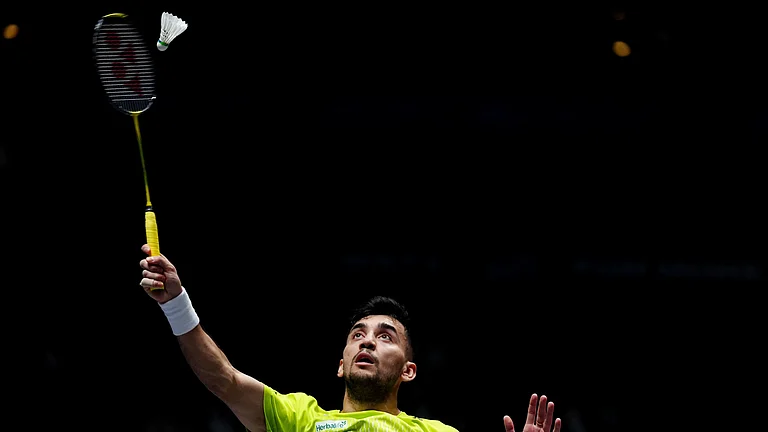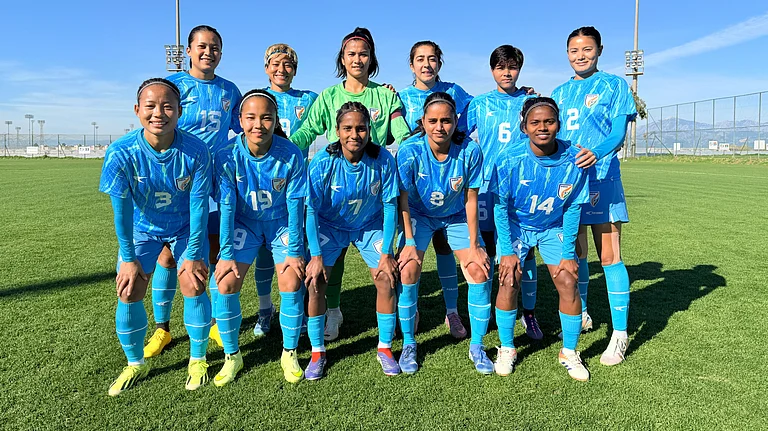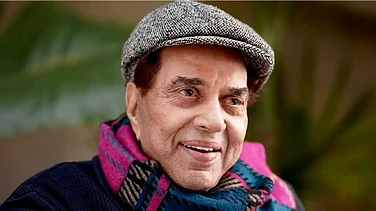In a scene from Zee5’s Saas Bahu Achaar Pvt. Ltd,, Shuklaji, played by Anandeshwar Dwivedi, tells his friend about a book he once tried to sell for months in vain. “Then I thought to myself, I must read this book to see why no one wanted to buy it,” he says to Suman (Amruta Subhash), his soon-to-be business partner. It’s a scene that echoes the character’s ethos through the most literary of subtexts. Out of curiosity, he chooses to read a book that does not sell, rather than the many that usually do or would have. Shuklaji is an anomaly, a rarest of rare meteor sighting in the night sky of Indian culture and cinema. He is a 42-year-old man who lives in Purani Dilli and represents the elusiveness of life’s many franchises—money, class and quite possibly, caste. But he also embodies the rare breed of disenfranchisement that Hindi cinema has, over decades, invisibilised through the youthfulness of pursuing love, and the wisdom of sustaining families. He, in fact, represents the disenchanted middle—people to whom life, as cinema has often exhibited—simply doesn’t happen.
True to India’s cinematic tradition, our protagonist can only exist in two states—in pursuit of love or falling out of it. Which relegates the middle-aged—the 40s and 50s—to the kind of decorative erasure that really only sparkles with life in the context of an affair or a scandal. Men and women in their 40s and 50s are possibly considered literary paperweights, there to convey the sanctity of the room—read family—by appearing as an imposing form of social furniture. Even in Sooraj Barjatya’s cinema, where marriage and family collide as one big cosmic event of ecstasy and hallucination, the middle ages are conveniently either absent or make up the backstage to a more youthful story. Sure, Hindi cinema has matured enough, thanks largely to the films of Gulzar that question the many antecedents of the happily-ever-after narrative, but there has always been the invocation of a variety of sacredness to that line of questioning. As in, love and marriage are inevitable but necessary dramas, until they are also interpreted as tragedies.

There are some examples, few and far between, strewn across Hindi cinema as the result probably of carefully curated atrophy or simply, chaotic seat-filling. In Farhan Akhtar’s Dil Chahta Hai, Rajat Kapoor plays Mahesh, a middle-aged uncle to Shalini (Preity Zinta) who never quite bit the bullet. His single life isn’t extensively queried but he lies there, often in the background of intense sequences, nonplussed by the gravity or emotion of things happening around him. In the cult comedy Andaz Apna Apna, Javed Khan Amrohi plays the unsubtly named Anand Akela, a seemingly middle-aged man who is content with playing second-fiddle to younger men trying to tacitly find and formalise their unions. “Main Anand Akela, akela hi theek hoon,” he says in a scene after humbly accepting his second-rank status, both inside the world of the film and possibly outside as well.
In Jeevan Dhaara, Rekha plays a woman who must support her family because her brothers are wasteful morons. On the cusp of marriage, she has to back down from a life of matrimony to return to familial duties and burdens. Here, the lack of the franchise of marriage is told as tragedy. Its climax has a visibly torn Rekha expressing her dejection about missing the opportunity to tie the knot (with a wealthy man, mind you). In Mera Naam Joker, Raju limps through adulthood with the burden of looking after an ailing mother. He finds love, but life never quite allows him to grab it. In Asit Sen’s Khamoshi, a hauntingly brilliant Waheeda Rehman cures a patient while falling, hopelessly in love with him. He recovers his memory but forgets her in return. In these stories love is felt, family envisioned, but life never quite materialises in the grand methods that Bollywood had come to employ as a matter of regularity. But then, there is still youthful exuberance to these stories, even if it is cultivated on the soil of regret and one-sided affection. There is no disenchantment, at least not like Shuklaji’s.

Shukla’s world is carefully coiled into the wider narrative of the entrepreneurial spirit that Saas Bahu Achaar Pvt. Ltd. seeks to champion. His earnest, supportive demeanour balances his economic deprivation, unlike grittier formats that see the same disenfranchisement through the lens of crime. Shuklaji sells pens, books and stockings at the ISBT in Delhi, but he rarely thinks twice about supporting a woman-led business when it crops up in his neighbourhood. He is succinct, but also witless in certain situations, enterprising but also no genius. Of course, a lot of this has to co-exist alongside the wilful ignorance of a world that looks past his sexuality and depravity but that said, his deprivation is not directly linked to his inability to have found love, or have fallen for someone. In fact, that question doesn’t even come up.
There are a number of questions that can be asked about the reluctance to write a Shuklaji or a story around a character like him. Some of these puncture the very preamble to good storytelling that we have chosen to identify with as a culture. Can a story really exist without love? Or are stories without romantic love, familial devotion or parental reckoning not worth telling? Then there are the more obvious questions that flirt with the superficialities of the creative businesses. The number of middle-aged actors, the kind of roles they get cast in and what exactly they play in those roles, aside from being frivolous enablers to someone else’s story arc.
The point of Shuklaji in this rarest of rare character portrayals is to exist as the compliant neighbour, the uncomplicated friend or dependable asexual business partner. Such alliances are hardly thinkable at any age in popular cinema, but in the middle-aged, it’s perhaps revelatory. Shuklaji doesn’t really have an arc in the series. He undergoes no drastic transformations because, of course, he isn’t the protagonist. Here too, the protagonist is a divorced woman who has seen love and family and has now been culled from subscribing to its touted legacies. But even next to the traditional protagonist, Shuklaji stands out as a whimsical but believable character whose existence is beguiling for the simple reason that we haven’t seen him on screen before.
It’s understandable that a character like Shuklaji arrived in the full flesh on an OTT platform, because inside theatres there simply isn’t room for unmoored, untaken middle-aged men and women who are still trying to figure life out. It’s the platform that many Shuklas and Miss Shuklas probably never get around to. Not because the platform might be incorrect, but maybe because they wish to never take THE journey, or the journey never quite managed to convince them to come either.
(This appeared in the print edition as "The Whimsical, Believable Middle-age")
(Views expressed are personal)
Manik Sharma writes on arts, culture and cinema

















